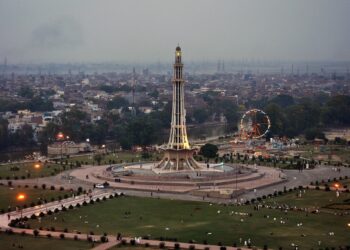Saturday Sept 14, 2013, Lahore: A five-year-old girl was brutally gang-raped in the capital of Pakistan’s Punjab province and dumped outside a hospital, officials said today. The girl was left outside Sir Ganga Ram Hospital in Lahore yesterday after being brutally raped by unidentified men.
The girl, who had earlier been reported missing, was provided immediate emergency aid by hospital staff before being moved to Services Hospital. According to doctors and staff, the five-year-old is being kept under strict observation.
A rape case was registered against unknown suspects at Mughalpura Police Station. Punjab Chief Minister Shahbaz Sharif took notice of the incident and directed authorities to immediately arrest the rapists.
But why only arrest?
Does this solve the issue?
No, the person should be treated according to the what Islamic laws says :
Allah says in the Holy Quran, Chapter 24, Surah Noor, verse 2:
The woman and the man guilty of ‘zina’ (fornication) flog each of them with a hundred stripes: let not compassion move you in their case in a matter prescribed by Allah if ye believe in Allah and the Last Day: and let a party of the believers witness their punishment.
Sahih Al-Bukhari Hadith 8.810 Narrated by Jabir
A man from the tribe of Aslam came to the Prophet (saws) and confessed that he had committed adultery (illegal sexual intercourse). The Prophet (saws) turned his face away from him till the man bore witness against himself four times. The Prophet (saws) said to him, “Are you mad?” He said “No.” The Prophet (saws) asked, “Are you married?” He said, “Yes.” Then the Prophet (saws) ordered that he be stoned to death, and he was stoned to death at the Musalla (public gathering place).
Regardless of whether it is consensual or non-consensual, any sexual intercourse between a man and a woman who are not united in the bond of marriage is termed ‘Zina’ in Shariah terminology.
Shariah Law prescribes that if one is convicted for the crime of ‘zina’ (unlawful sexual intercourse) in a Shariah Court of Law, their punishment will be by their marital status; if married, they are to be stoned to death, and if unmarried, they are to be flogged a hundred lashes.
If it is proven in court that the woman was raped, she is blameless, and the person who raped her would be accorded the due punishment for ‘Zina’ according to his marital status.
If it is proven in a Shariah Court of Law that the one who committed the heinous crime of rape (with an adult woman or a minor) also committed other crimes in addition to the evil of rape, like abducting victim, using or ammunition to subdue the victim, or physically hurting or injuring the victim, etc., then the prescribed punishments for those crimes will be added to the prescribed punishment of ‘Zina’.
The above is only the prescribed punishment, Shariah or Islamic Law, that allows the righteous society or Islamic State to exact retribution from the criminal in the life of this world. If the person who committed this evil and heinous crime does not repent for their sins, the punishment in the hereafter in the presence of the Majestic Lord would be much more severe and much more lasting!
What does Pakistani law says?
The Hudood Ordinance (Urdu: حدود مسودہ) (also spelled Hudud) was a law in Pakistan that was enacted in 1979 as part of then-military ruler Muhammad Zia-ul-Haq’s Islamization and replaced or revised in 2006 by the Women’s Protection Bill.
The Hudood Law was intended to implement Islamic Shari’a law, by enforcing punishments mentioned in the Quran and Sunnah for Zina (extramarital sex), qazf (false accusation of zina), an offense against property (theft), and prohibition (of alcohol consumption).
The ordinance has been criticized as leading to “hundreds of incidents where a woman subjected to rape, or even gang rape, was eventually accused of Zina” and incarcerated, which is defended as punishment ordained by God.
Islamic law used in other countries states that rapists must be punished under laws dealing with “armed robbery” (hiraba). In Pakistan rape, or “Zina bil Jabr” (lit: “forced adulterous sex”) is punishable by death.
In 2006, then President Pervez Musharraf again proposed reform of the ordinance. On November 15, 2006, the Women’s Protection Bill was passed in the National Assembly, allowing rape to be prosecutable under civil law. The bill was ratified by the Senate on June 23, 2006, and became law after President Musharraf signed it on June 1, 2006.
Follow INCPAK on Google News / Facebook / Twitter / Instagram for updates.




















